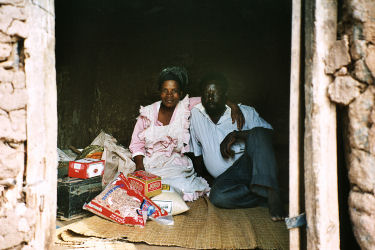Aids Orphans in Swaziland

Swaziland is in south-east Africa, bordered by Mozambique and South Africa. It is one of the world’s last remaining absolute monarchies. Two-thirds of Swazis live in poverty, most of them in rural areas. Nearly 40 per cent are HIV-positive, giving Swaziland the highest HIV prevalence rate in the world - 38.8% of the adult population. The situation is likely to worsen as the rate among 20- to 30-year olds is nearly 50%. 65% of orphans are AIDS orphans. The goal for government and Non Governmental Organisations is to increase access to anti-retroviral drugs, promote awareness and prevent transmission.
SOS Children in Swaziland
The target groups for the projects are:
- Child headed families
- Grandparent led/headed families.
- Families headed by other relatives.
We primarily support 60 families around 300 orphaned children within the townships. The project will provide home-based care. 15 community volunteers are responsible for 4 to 5 families each and provide what is necessary for their individual family circumstances. The main objective is to help families stay together in their traditional communities avoiding desperate situations which typically lead to child abandonment.
The community volunteers provide:
- Information about HIV/AIDS
- Care for the sick and needy
- School fee support
- Help and counselling
- Vocational training and income generating activities
- Psychological treatment - after the loss of loved ones
- Health services and medical treatment
The project emphasises the involvement of children in the participatory decision making over their own future and the measures that will be taken.
We focus on assisting children to be self-sufficient and grow independently.
Mbabane: This small AIDS project focuses on the two townships of Sidvwashini and Msunduza on the outskirts of the capital Mbabane. These two townships have, as a result of the AIDS-pandemic, the highest mortality rate in Swaziland. More than 25 percent of all adults are infected with HIV/AIDS. The living standards for the majority are below the poverty line. Pure water, sewerage systems and other sanitary installations are not available.
If you interested in helping the situation in the Swaziland you might like to consider how to sponsor a child in Swaziland.

 Return to Schools Wikipedia Home page…
Return to Schools Wikipedia Home page…
